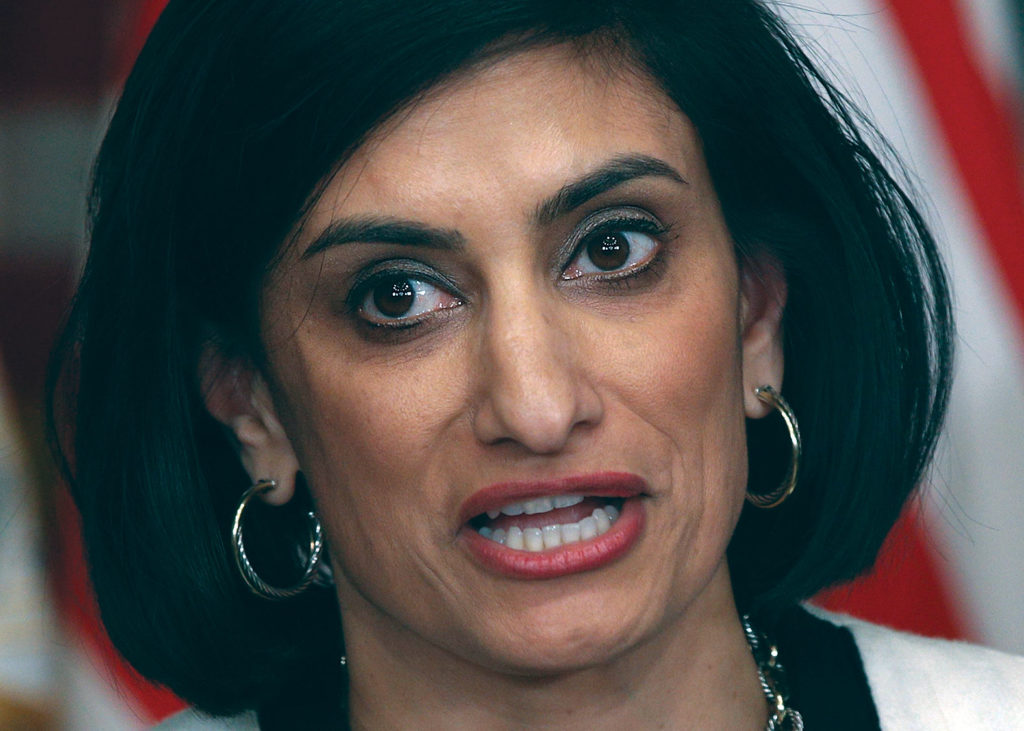
The Centers for Medicare & Medicaid Services announced Friday afternoon that it has levied more than $15 million in fines and tripled the most severe type of citations to nursing homes during the six months of the COVID-19 pandemic.
More than 3,400 nursing homes have been cited for noncompliance with infection control requirements or failure to report COVID-19 data, the agency said.
In the last 11 days alone, CMS said it has cited more than 3,300 deficiencies and imposed more than $5.5 million in Civil Monetary Penalties to the less than 1% of nursing homes that had failed to report required COVID-19-related data to the Centers for Disease Control and Prevention, or had lapsed in reporting.
The announcements come a day after CMS Administrator Seema Verma held a special conference call with nursing home stakeholders noting an alarming rise in COVID-19 nationally in facilities. She attributed the worrisome trend to increased prevalence of coronavirus infections in areas surrounding afflicted facilities but also to a troubling degree of infection control lapses by providers.
She emphasized Thursday that the recent rise in cases is “not just a testing issue or a supply issue.”
“Our deep concern is that even in nursing homes that are doing testing on a regular basis that we’re still seeing significant spread,” she said. She explained that federal strike teams and Quality Improvement Organizations (QIOs) are seeing “significant deficiencies in infection control practices.”
In Friday’s broadly disseminated announcement, Verma said the administration is “taking aggressive enforcement action against Medicare and Medicaid certified nursing homes that fail to implement proper infection control practices. Now more than ever, nursing homes must be vigilant in adhering to federal guidelines related to infection control to prevent the spread of infectious disease, including COVID-19. We will continue to hold nursing homes accountable and work with state and local leaders to protect the vulnerable population residing in America’s nursing homes.”
A day earlier, on the call with provider stakeholders, Verma expressed total backing for them.
“We are here to help you and support you. This isn’t a time of fines and being punitive,” she emphasized. “It is a time … to be problem solvers. I want you to know that whatever you need, we are here to help you on any level, whether it’s staffing, supplies, testing, technical assistance, we’re here to get you whatever you need.”
Since March 4, CMS and state survey agencies have completed upgraded infection control surveys in more than 15,200 (99.2%) of nursing homes, the federal agency said. They have netted 180 Immediate Jeopardy findings for infection control — triple the rate found in 2019, according to CMS.
Immediate Jeopardy represents a situation in which a nursing home’s noncompliance with CMS requirements of participation has caused or is likely to cause serious injury, serious harm, serious impairment, or death to a resident.
Friday’s announcement also noted that as of August 3, more than 99% of facilities had reported COVID-19 reporting data to the CDC. The rest, however, had not reported data or had lapsed their regular reporting, leading to the $5.5 million in fines.
Friday’s unusual announcement about fines and penalties during the pandemic came a day after the largest nursing home association in the country released survey results showing 70% of providers said they couldn’t sustain operations much longer under current operating conditions.
That group’s leader, President and CEO Mark Parkinson of the American Health Care Association / National Center for Assisted Living, expressed puzzlement over the timing and content of CMS’s latest bravado concerning nursing home enforcement.
“We appreciate the importance of maintaining strong infection control practices and welcome feedback from public health officials on how we can further improve,” Parkinson said in a statement to McKnight’s Long-Term Care News. “However, the evidence clearly shows that even the best nursing homes with the most rigorous standards cannot stop this highly contagious and invisible virus. Our focus should be on getting a handle on the amount of spread in the surrounding community and prioritizing nursing homes for ongoing resources.”
He added that when fewer people in the community have COVID-19, they are less likely to end up in a nursing home. In addition, when providers have proper levels of personal protective equipment, reliable testing with rapid results and staff support, “they can better curb the spread.”
“We must foster a more collaborative approach to addressing this once-in-a-century, global crisis,” he emphasized. “Nursing homes cannot beat this pandemic alone, and focusing on enforcement and penalties only takes precious resources away at this critical time. Providers need the support of public health officials to prioritize our residents and help facilities acquire the necessary resources.”
Katie Smith Sloan, president and CEO of LeadingAge, an association of nonprofit providers of aging services, sounded similar cautions.
“When we know that community spread is a leading source of infection in long-term care, and members are paying tens of thousands of dollars — millions, in some cases — for PPE, tests, and other pandemic-related expenses,” she said. “Fines are not the answer. We need help and collaboration from CMS. A punitive approach is unsustainable.”
CMS noted Friday that it had issued “more than 18” sets of guidance in the last six months to provide states and nursing homes with ongoing information on proper infection control practices and protocols. In all of 2019, CMS issued only nine guidance documents of any type related to nursing homes, the agency said.
Part of the CMS’s enhanced enforcement bite kicked in after a June 1 when the agency put in place fines of up to $5,000 for persistent lower-level infection control deficiencies and up to $20,000 if infection control deficiencies were cited twice or more over the last two years.
This is a developing story. Please check back for updates.




